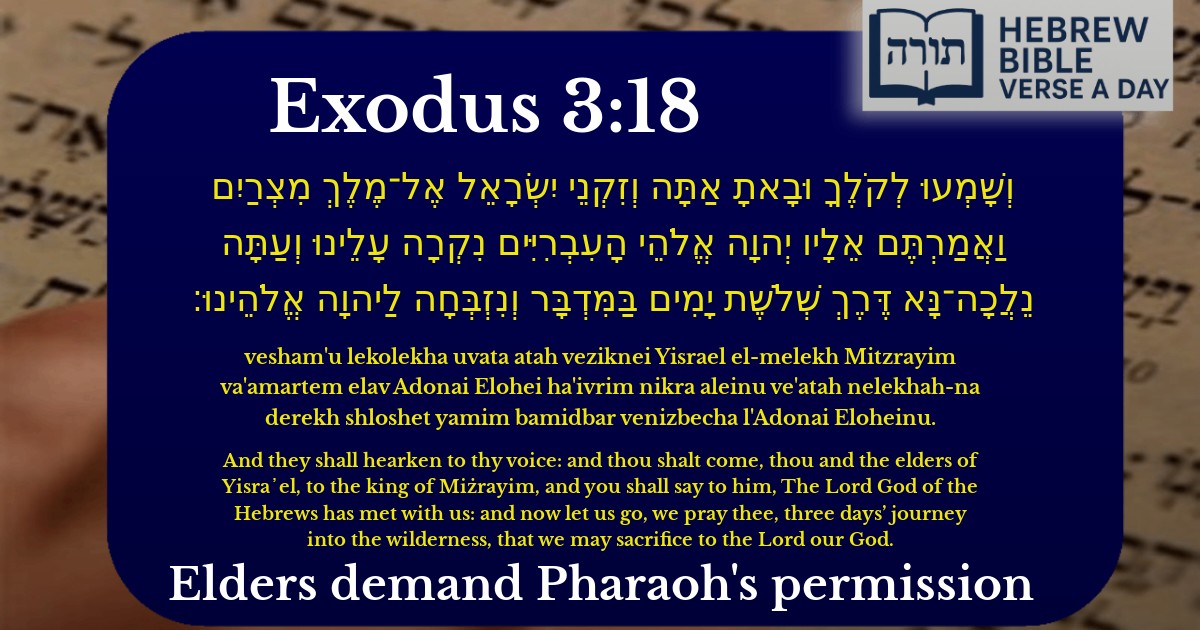Join Our Newsletter To Be Informed When New Videos Are Posted
Join the thousands of fellow Studends who rely on our videos to learn how to read the bible in Hebrew for free!
Hebrew Text
וְשָׁמְעוּ לְקֹלֶךָ וּבָאתָ אַתָּה וְזִקְנֵי יִשְׂרָאֵל אֶל־מֶלֶךְ מִצְרַיִם וַאֲמַרְתֶּם אֵלָיו יְהוָה אֱלֹהֵי הָעִבְרִיִּים נִקְרָה עָלֵינוּ וְעַתָּה נֵלֲכָה־נָּא דֶּרֶךְ שְׁלֹשֶׁת יָמִים בַּמִּדְבָּר וְנִזְבְּחָה לַיהוָה אֱלֹהֵינוּ׃
English Translation
And they shall hearken to thy voice: and thou shalt come, thou and the elders of Yisra᾽el, to the king of Miżrayim, and you shall say to him, The Lord God of the Hebrews has met with us: and now let us go, we pray thee, three days’ journey into the wilderness, that we may sacrifice to the Lord our God.
Transliteration
Vesham'u lekolekha uvata atah veziknei Yisrael el-melekh Mitzrayim va'amartem elav Adonai Elohei ha'ivrim nikra aleinu ve'atah nelekhah-na derekh shloshet yamim bamidbar venizbecha l'Adonai Eloheinu.
Hebrew Leining Text
וְשָׁמְע֖וּ לְקֹלֶ֑ךָ וּבָאתָ֡ אַתָּה֩ וְזִקְנֵ֨י יִשְׂרָאֵ֜ל אֶל־מֶ֣לֶךְ מִצְרַ֗יִם וַאֲמַרְתֶּ֤ם אֵלָיו֙ יְהֹוָ֞ה אֱלֹהֵ֤י הָֽעִבְרִיִּים֙ נִקְרָ֣ה עָלֵ֔ינוּ וְעַתָּ֗ה נֵֽלְכָה־נָּ֞א דֶּ֣רֶךְ שְׁלֹ֤שֶׁת יָמִים֙ בַּמִּדְבָּ֔ר וְנִזְבְּחָ֖ה לַֽיהֹוָ֥ה אֱלֹהֵֽינוּ׃
Parasha Commentary
📚 Talmud Citations
This verse is not quoted in the Talmud.


Context in Shemot (Exodus) 3:18
This verse appears during Hashem's revelation to Moshe at the burning bush, instructing him on how to approach Pharaoh to request the Israelites' temporary departure for worship. The phrasing reflects both diplomacy and divine strategy in securing Bnei Yisrael's eventual freedom.
Key Themes and Interpretations
Midrashic Insights
The Midrash Tanchuma (Shemot 14) highlights that the three days symbolize preparation for receiving the Torah: one day to depart, one to return, and one for actual sacrifice—foreshadowing Matan Torah at Har Sinai. Alternatively, the Seforno suggests it reflects the time needed to purify oneself for divine service.
Halachic Implications
The Rambam (Hilchot Melachim 6:5) derives from this verse that leaders must advocate for their people's religious needs, even when facing powerful opposition. The phrasing וְנִזְבְּחָה לַיהוָה ("we may sacrifice") underscores the communal obligation of avodah (divine service).